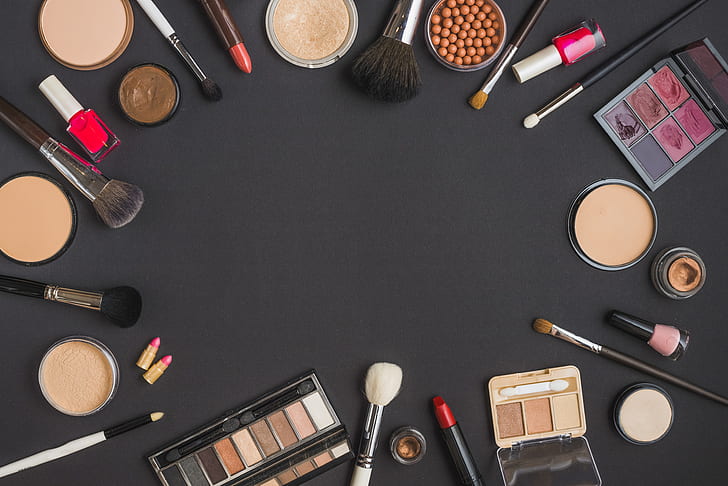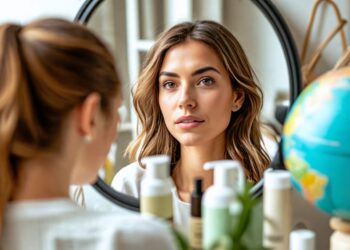The cosmetics and personal care sector stands at the precipice of unprecedented transformation as cutting-edge technologies reshape every aspect of the business. From artificial intelligence-powered skin analysis to augmented reality makeup trials, innovation is fundamentally altering how consumers discover, purchase, and experience beauty products. This technological metamorphosis represents far more than superficial changes—it signals a complete reimagining of an industry worth hundreds of billions of dollars globally.
The Digital Transformation of Beauty Commerce

Traditional beauty retail has undergone seismic shifts in recent years, with digital channels becoming increasingly dominant. The integration of sophisticated technologies has created entirely new paradigms for consumer engagement and product development. Companies that once relied solely on in-store experiences now leverage complex algorithms and data analytics to understand consumer preferences with remarkable precision.
The pandemic accelerated these trends exponentially, forcing brands to rapidly adopt digital-first strategies. What might have taken a decade of gradual evolution occurred within mere months, permanently altering the competitive landscape. Today’s beauty consumer expects seamless omnichannel experiences, personalized recommendations, and interactive digital tools that were science fiction just years ago.
Artificial Intelligence Revolutionizes Personalization

Artificial intelligence has emerged as perhaps the most transformative technology in modern beauty. Machine learning algorithms now analyze thousands of data points—from skin tone and texture to environmental factors and lifestyle habits—to deliver hyper-personalized product recommendations. These sophisticated systems can identify specific skin concerns, predict aging patterns, and suggest customized skincare regimens with accuracy that surpasses traditional consultation methods.
Major beauty corporations have invested heavily in proprietary AI platforms that power their digital ecosystems. These systems continuously learn from user interactions, refining their recommendations over time. The technology extends beyond simple product matching to include formulation assistance, where AI helps chemists develop new products based on identified market gaps and consumer needs.
Some innovative brands have introduced AI-powered skincare devices that consumers use at home. These gadgets analyze skin conditions in real-time, tracking changes over weeks and months to measure product effectiveness. The data collected feeds back into the company’s systems, creating a virtuous cycle of improvement and personalization.
Augmented Reality Changes Shopping Behavior
Augmented reality has revolutionized how consumers trial beauty products without physical contact. Virtual try-on technology allows shoppers to see how different lipstick shades, eyeshadows, or hair colors would look on their own faces through smartphone cameras or computer webcams. This innovation solves one of e-commerce’s greatest challenges—the inability to test products before purchase.
The technology has become remarkably sophisticated, accounting for lighting conditions, skin undertones, and even facial movements. Users can experiment with entire makeup looks, mix and match products, and save their favorite combinations for future reference. This eliminates the guesswork from online shopping and significantly reduces return rates, benefiting both consumers and retailers.
Beyond individual use, augmented reality has transformed in-store experiences as well. Smart mirrors in retail locations offer virtual try-ons without requiring physical product application, maintaining hygiene while enabling experimentation. These installations often include social sharing features, turning the shopping experience into shareable content that drives brand awareness.
Skin Analysis Technology Advances Dramatically

Modern skin analysis tools employ multiple imaging technologies to assess skin health with clinical precision. High-resolution cameras capture surface details, while specialized sensors measure moisture levels, oil production, and even sub-surface conditions. Some advanced systems use spectroscopy to analyze skin composition at the molecular level.
These diagnostic tools provide consumers with detailed reports that include:
A. Comprehensive assessment of fine lines, wrinkles, and texture irregularities
B. Identification of pigmentation issues, sun damage, and age spots
C. Measurement of hydration levels and moisture retention capacity
D. Analysis of pore size, clarity, and congestion patterns
E. Detection of redness, inflammation, and sensitivity indicators
F. Evaluation of skin elasticity and firmness characteristics
G. Assessment of overall skin health scores and improvement trajectories
The data generated by these analyses informs personalized product recommendations and allows users to track improvements over time. Many platforms store historical data, creating longitudinal records that demonstrate the effectiveness of recommended routines. This evidence-based approach builds consumer trust and encourages consistent product usage.
Blockchain Ensures Authenticity and Transparency
Counterfeit beauty products represent a significant problem for the industry, with fake goods potentially containing harmful ingredients. Blockchain technology offers a solution by creating immutable records of product authenticity and supply chain provenance. Each product receives a unique digital identifier that consumers can verify through smartphone apps.
This technology benefits brands by protecting their reputation and revenue, while consumers gain confidence that they’re purchasing genuine products. Some companies have extended blockchain implementation to include complete ingredient transparency, allowing customers to trace every component back to its source. This level of openness resonates particularly well with younger consumers who prioritize ethical consumption.
Blockchain also facilitates new business models, including tokenized loyalty programs and digital collectibles tied to physical products. These innovations create additional engagement opportunities and strengthen brand communities.
Sustainability Through Technological Innovation
Environmental concerns have become central to beauty industry discourse, with consumers demanding more sustainable practices. Technology plays a crucial role in addressing these concerns through various innovations. Advanced formulation software helps chemists develop products with reduced environmental impact, optimizing ingredient selection for both efficacy and sustainability.
Manufacturing technologies have evolved to minimize waste and energy consumption. Precision filling systems reduce product spillage, while smart factory systems optimize production schedules for maximum efficiency. Some facilities now operate with renewable energy and closed-loop water systems, dramatically reducing their environmental footprint.
Packaging innovations driven by material science research have produced biodegradable containers, refillable systems, and packaging made from recycled ocean plastics. Brands increasingly communicate these efforts through technology, using QR codes and apps to educate consumers about their sustainability initiatives and encourage responsible disposal.
Biotechnology Transforms Product Development
Biotechnology has opened entirely new frontiers in beauty product formulation. Scientists now use cellular agriculture to produce sustainable alternatives to traditional ingredients, growing compounds in laboratories rather than harvesting them from plants or animals. This approach ensures consistency, reduces environmental impact, and enables the creation of novel ingredients impossible to obtain through conventional means.
Genetic research has revealed insights into skin aging mechanisms at the molecular level, leading to the development of highly targeted treatments. Peptides, growth factors, and other bioactive compounds designed through biotechnology offer unprecedented efficacy. Some brands have even introduced personalized supplements and topical products based on individual genetic profiles.
Microbiome research represents another frontier, with scientists developing products that support beneficial skin bacteria while controlling problematic microorganisms. This holistic approach to skin health reflects a broader shift toward treating skin as a complex ecosystem rather than a simple barrier.
Social Commerce Reshapes Marketing
Social media platforms have evolved into powerful commerce channels, with beauty brands leading the charge in social selling. Live-streaming shopping events, particularly popular in Asian markets, allow influencers and brand representatives to demonstrate products in real-time while viewers purchase instantly through integrated checkout features.
User-generated content has become invaluable for marketing, with authentic reviews and tutorials often proving more persuasive than traditional advertising. Brands cultivate communities of advocates who create content organically, effectively serving as decentralized marketing departments. Advanced analytics help identify influential community members and measure campaign effectiveness with unprecedented granularity.
The integration of commerce features directly into social platforms has reduced friction in the purchasing process. Consumers can discover products, read reviews, watch tutorials, and complete purchases without ever leaving their favorite apps. This seamless experience has proven particularly effective for impulse purchases and limited-edition releases.
Virtual Influencers and Digital Marketing
Computer-generated influencers have emerged as controversial yet effective marketing tools. These digital personalities, created through advanced CGI and animation, promote products to millions of followers across social platforms. They offer brands complete control over messaging while maintaining the aspirational appeal of human influencers.
Virtual influencers never age, never create scandals, and can appear in multiple locations simultaneously. They represent idealized brand ambassadors that transcend human limitations. However, their use raises questions about authenticity and transparency, with some consumers feeling deceived by non-human endorsers.
Beyond virtual influencers, brands employ sophisticated digital marketing technologies including programmatic advertising, predictive analytics, and dynamic creative optimization. These tools enable hyper-targeted campaigns that reach specific consumer segments with personalized messaging at optimal times.
Data Privacy and Ethical Considerations
The beauty industry’s technological evolution raises important privacy questions. Companies collect vast amounts of personal data—facial images, skin condition information, purchasing habits, and more. While this data enables personalization, it also creates responsibilities regarding storage, security, and usage.
Progressive brands have implemented transparent data policies, clearly communicating what information they collect and how they use it. Some offer consumers control over their data, including options to download, delete, or limit sharing. Building trust through ethical data practices has become a competitive differentiator.
Regulatory frameworks like GDPR and CCPA have established legal requirements for data handling, but best practices often exceed minimum compliance. Companies that prioritize consumer privacy position themselves favorably as regulatory scrutiny intensifies globally.
The Future of Beauty Technology
Emerging technologies promise even more dramatic changes in coming years. Nanotechnology could enable targeted delivery of active ingredients to specific skin layers. Brain-computer interfaces might eventually allow direct measurement of stress levels and other factors affecting skin health. Three-dimensional bioprinting could produce customized sheet masks or even grow skin tissue for advanced treatments.
The convergence of beauty and wellness continues accelerating, with holistic health tracking becoming standard. Wearable devices that monitor sleep, stress, nutrition, and exercise will increasingly integrate with beauty routines, providing comprehensive lifestyle recommendations. The distinction between beauty products and medical treatments will continue blurring as efficacy improves.
Artificial intelligence will become even more sophisticated, potentially predicting skin concerns before they become visible and recommending preventative interventions. Virtual reality might enable immersive brand experiences, allowing consumers to virtually visit ingredient sources or explore the science behind formulations.
Conclusion
The beauty industry’s technological revolution represents far more than trendy innovations—it fundamentally transforms how products are developed, marketed, sold, and used. Companies that embrace these changes while maintaining focus on consumer needs and ethical practices will thrive in this new landscape. Those that resist evolution risk obsolescence in an increasingly digital, data-driven, and personalized market.
For consumers, these technologies offer unprecedented control over their beauty routines, with personalization, transparency, and effectiveness reaching new heights. The future promises even more exciting developments as innovation continues accelerating, making this an extraordinarily dynamic time for everyone involved in the beauty industry.





